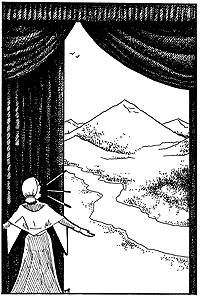New Territories
Austin Lyric Opera Ventures Into the Frontier Once More
By Robert Faires, Fri., Jan. 3, 1997
 illustration by Robert Faires |
The same might be said for Austin Lyric Opera (ALO). In the 10 years that this company has been enlivening our arts scene, ALO has made it clear that venturing onto new ground is part of who it is. Simply by trying to create a professional opera company in a city with no such animal, a city where most opera was confined to the academic arena, ALO was crossing a frontier. It had nothing on which to base its belief that Austin would support opera at all, much less professional opera on the scale of the Bass Concert Hall, the 3,000-seat venue that ALO had decided would be its home. But it plunged ahead anyway. Fortunately for ALO, this was one instance in which someone built it, and they did come. ALO's early productions boasted sold-out houses for several performances and 90% attendance for most of the rest. Of course, it didn't hurt that the company was producing some of the most popular works in opera: The Magic Flute, Die Fledermaus, La Traviata, Carmen, Madame Butterfly... But programming "name" operas in generally traditional stagings was a necessary strategy given the financial stakes. What's worth noting is that, once it paid off, ALO could easily have kept securely to the middle of the road, repetoire-wise, and it didn't. As soon as it had established itself, ALO began moving further afield of that center line, trying new things: a updated version of The Abduction From the Seraglio; a production of Beethoven's opera Fidelio; an abstract staging of Lucia di Lammermoor. The Romantic mainstays were still there, but squeezed in among them at every opportunity was a step onto new ground.
This time a year ago, ALO was making perhaps its boldest venture yet into new territory: staging its first Wagnerian opera. Getting to the point where it could produce such an enormous enterprise as an opera by Wagner -- with its epic score; heroic singing roles; grand, demanding orchestral and choral parts; and overall sweep and scope of vision involved -- was a major undertaking, and ALO began to lay the groundwork years before the actual production. It was a major risk for the company, not least because it would be such a departure from the kind of opera that ALO had produced to date. This was not the sassy stamp of Bizet or the flutter of Puccini wings; this was thunder, deep, primal, and rolling on for hours. Would the audience that had crowded in to see these other works come for thunder? ALO could only guess, but it gambled on the idea that nine years of steadily raising the stakes, taking its patrons on progressively more ambitious operatic adventures, would be sufficient preparation. It was. They came, and what they saw in ALO's Tannhauser was a bold march into the thicket of Wagner's Black Forest. It may not have been without stumbles, but there was no hesitation; ALO gave the production its all.
This January finds ALO again heading into a new frontier: American opera. The Ballad of Baby Doe, opening January 10, is the company's first work by an American composer.
American opera is often unjustly neglected and disparaged, the red-headed stepchild of the form. So many European composers had created operatic masterworks by the time this country was old enough to compose for itself that its work was bound to suffer by comparison. Yet when taken on its own terms, American opera is capable of considerable lyrical and dramatic power. The Ballad of Baby Doe comes out of what is arguably the most fertile, if not necessarily the greatest, decade for American operas, the 1950s. It was during this decade that Aaron Copland composed The Tender Land; Samuel Barber wrote Vanessa; Carlisle Floyd produced Susannah; Gian Carlo Menotti wrote The Consul, The Saint of Bleecker Street, and that Christmas favorite, Amahl and the Night Visitors; and Leonard Bernstein composed the opera Trouble in Tahiti, and a pair of musicals that court opera, Candide and West Side Story. Not bad for a red-headed stepchild.
Like many of his contemporaries, Moore was interested in American settings and musical idioms. He drew on folk tunes and other indigenous musical styles -- ragtime, jazz -- for his melodies. He found his stories on native soil. Prior to The Ballad of Baby Doe, he had composed an opera based on The Devil and Daniel Webster. Baby Doe was taken from a newspaper story describing the death of an old woman near a mine in Colorado. She was the widow of a man who had made a fortune from silver mining but had lost it all when gold dislodged silver as the monetary standard of choice. Before he died, she pledged to keep his mine and lived by it, alone and penniless, for decades. Doing further research, Moore and his librettist, John Latouche, found an even more compelling history to the woman: She had fallen in love with her husband, Horace Tabor, when he was already married, and their romance caused a scandal. Tabor had been not only rich, but politically connected; he was a Senator briefly, appointed to finish out someone else's term, and when Tabor and Baby Doe were at last married, President Chester A. Arthur attended their wedding reception. Tabor gambled everything on his belief in silver, and when that fell through, he lost everything but his wife's love and support. Moore and Latouche were able to condense this couple's history into a highly dramatic and touching tale, one in which the strains of waltzes and folk melodies and even hymns not only make the work eminently accessible to American audiences but personal for them. It is so accessible, in fact, that it might almost be musical theatre.
Now, an American work, especially one that leans in the direction of musical theatre, may not seem so much like it's challenging new territory following Wagner or even as intricate a standard as the season opener, Mozart's The Magic Flute; it sounds rather like pushing past the Rocky Mountains in winter to tackle the California coast in springtime; how rough. But musical rigors and epic narratives don't always tell the tale. With some operas, an artist may be able to get away with standing still and singing, that is, letting the music and voice convey all the emotion within a character or scene. Not so with The Ballad of Baby Doe. Precisely because it is so close to theatre, this opera demands careful attention to acting. The cast must bring their characters to life through their faces, their movements, what they do as much as what they sing. In the end, that still may not compare to the demands of a Wagner, but that doesn't make it a piña colada by the poolside.
And Baby Doe faces the same issue as Tannhauser in terms of audience: Will American opera play among fans who have been nurtured along on the European masters? Have Austinites absorbed the disturbing condescension toward American works that comes from some corners of the opera world? Or will they just be indifferent, possessing nothing on which to peg this opera besides the fact that it's American? After all, it isn't as if Douglas Moore -- or most of this country's composers of opera -- have the bankable name of a Verdi or Mozart. These are very real risks where the producing company is concerned, and they have long-term implications. If an accessible 20th-century American opera fails to sell, will ALO feel that it can gamble on other American works? Or even other 20th-century works?
So there are chances to be taken in crossing the terrain into American opera. And it seems apt that ALO is risking them with a work that takes the frontier of a century past as its setting. In the late 1800s, the West was well on its way to being settled, but there were still great swaths of it that lay untouched. These might be regions of astonishing beauty, breathtaking in their opportunity, however, they could still crush the life out of someone who gambled against them and lost. Just because Austin Lyric Opera has been around for 10 years doesn't mean that it doesn't face very real dangers every time it mounts a production. It does -- the same danger of ruin that miners faced in the Colorado of old. But it continues to gamble, to risk ruin in order to share the majestic beauty within these operas. That's part of who Austin Lyric Opera is, and for that we can be grateful.
The Ballad of Baby Doe runs January 10-13 at Bass Concert Hall, UT campus.








